José María Gil Robles © Rastrojo
“Be of good cheer about death,” wrote Socrates, “and know this as a truth: that no evil can happen to a good man, either in life or after death.” I don’t think I’m in absolutely full agreement with that particular aphorism, I’m afraid, but clearly Socrates believed that a good man lived on, at least in memory, and I hope that proves to be true in the case of José María Gil-Robles Gil-Delgado, one-time President of the European Parliament. We must remember that Socrates was writing more than two-and-a-half millennia ago, and things have changed a bit since then, but he clearly felt that a great man lives on, at least in people’s memories, as indeed he (or she) should. The “bad apples” we must try to forget about; there will always be a few of them about. Some great men achieve the affection and admiration of others by a calm belief in doing one’s duty without making a fuss about it. I always enjoyed the occasions on which I had to interview Gil-Robles, whether for television, radio, or the written press, because he was such a pleasant and polite person with whom to hold a conversation. That cannot be said – sadly – for all MEPs, then or now. He invariably tried to supply the information being requested, too, and appeared to take an interest in the question and the questioner, which is quite unusual.
“This House mourns him and pays tribute to his legacy,” said the current President of the European Parliament, Maltese conservative member Roberta Metsola, after firstly evoking the parliamentary career of Gil-Robles and asking her fellow MEPs to join her in a minute’s silence before the voting began on the issues of the day. She also reminded members about some of his achievements: “He will be remembered for having ensured that the Parliament was directly involved in the negotiations of the Amsterdam Treaty, including the inclusion of the legal basis for the adoption of the Members’ Statute, thanks to which the Parliament became more independent,” she said.

José María Gil-Robles Gil-Delgado, who died in the middle of February, cut an unusual figure: a tall, imposing, quietly-spoken man who never-the-less helped pilot the European Parliament through a variety of important changes during his fifteen years as a member and two-and-a-half years in the President’s chair. From 1997 until 1999, he served as President, and proved to be a remarkably good and a popular one. He could never have been mistaken for any other member, either: his huge beard and bald dome of a head ensured instant recognition. In her tribute to him before the whole House, though, it was his achievements, of course, that were highlighted by Metsola. She reminded Members of the many capacities in which he had served. He will, perhaps, be best remembered for ensuring the Parliament played a central rôle in negotiations ahead of the Treaty of Amsterdam, under which a diverse range of powers were transferred from national governments to the European Parliament. Indeed, some of the right-wing British politicians who lobbied for their country to quit the EU altogether cited the Amsterdam Treaty as one of their main motives for leaving. The legislation involved in this, included laws on immigration and on civil and criminal issues as well as enacting common foreign and security policies. The Treaty also implemented institutional changes for expanding the EU as new member nations joined. Significantly, the new Treaty included the legal base for the adoption of the Members’ Statute, which gave the European Parliament much wider independence.
We must not forget the arrival of the euro as the EU’s common currency in 1999, either. It was introduced in 11 countries for commercial and financial transactions only to begin with, the notes and coins arriving later. The first countries to adopt the euro were Austria, Belgium, Finland, France, Germany, Ireland, Italy, Luxembourg, the Netherlands, Portugal and Spain. Fellow-members Denmark, Sweden and the United Kingdom opted to stay out for the time being (in the UK’s case indefinitely, as it transpired). Gil-Robles played an enormous part in the preparations for the change. He was also deeply involved in the accession negotiations for the acceptance into the EU family of ten new member states, although the actual enlargement came a couple of years later, in 2004.
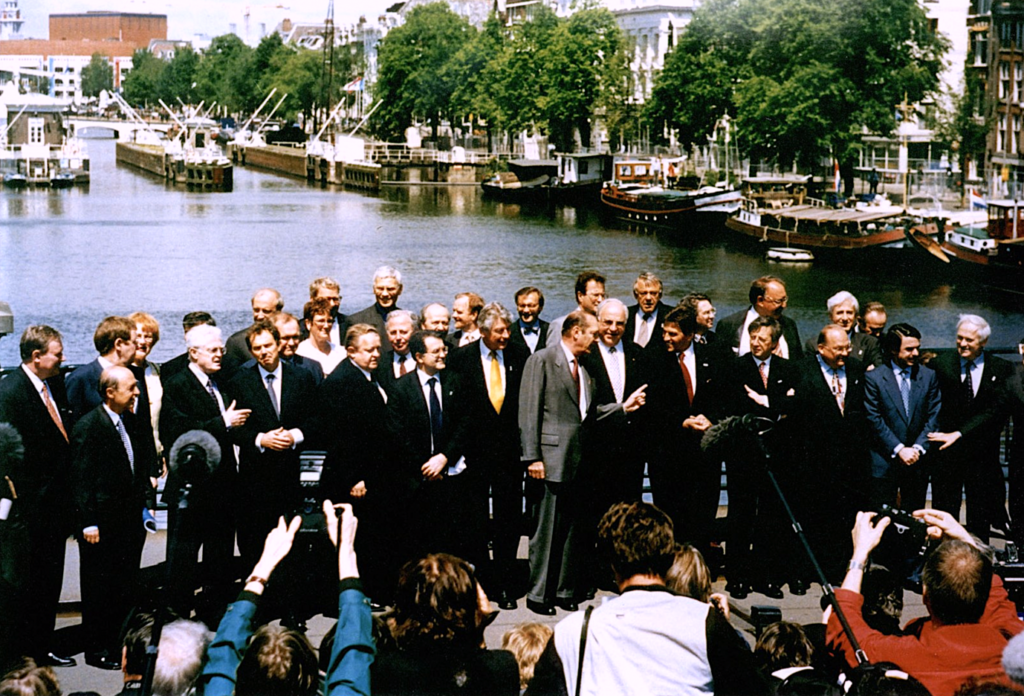
Altogether, it involved ten new member countries: the Czech Republic, Hungary, Poland, Slovakia, Slovenia, Lithuania, Latvia, Estonia, Malta and the Greek Cypriot Administration of Southern Cyprus. Bulgaria and Romania followed suit on the 1 January 2007. Throughout the endless meetings, reems of paper and hours of negotiations, Gil-Robles remained a devoted and ever-patient participant and architect of change.
| A MAN AND HIS ACHIEVEMENTS
Certainly, Gil-Robles seems to have left behind a favourable impression on those with whom he worked, including those from very different nationalities and political families. Take, for instance, Frank Schwalba-Hoth, a founder of Germany’s Green Party. “In general, there is every two-and-a-half years a (new) president in the European Parliament – that means that I have seen since 1984 a broad range of personalities in this post,” he told me, referring back to Gil-Robles. “Compared to the others, Jose María Gil-Robles was someone with a rare mix of natural authority, determination, friendliness, political values and sometimes even shyness.” I was a journalist at the European Parliament for many years, so I never had to work really closely with him, although I interviewed him a great many times. Schwalba-Hoth made a further observation about his character that strikes me as being especially truthful and appropriate: “He was the opposite of a charismatic populist.” That doesn’t mean he wasn’t popular, of course, merely that he didn’t just seek personal popularity for himself (unlike quite of few of today’s leading politicians), although he certainly was charismatic, a quality that seemed to come naturally to him. In politics, that makes him quite a rarity. Born in Madrid in 1935, but growing up in Portugal, Gil Robles served as an MEP through three consecutive legislatures, from 1989 to 2004, that period including his Presidency, of course, from 1997 to 1999.
In many ways, Gil-Robles’ term of office was marked by drama. Under his Presidency, the House contributed to the many and various decisions that preceded the arrival of the euro as the EU’s common currency. Britain’s decision to leave the Union without ever adopting the euro seems to have done irreparable damage to the country’s trading opportunities and options for the future. Gil-Robles’ were the careful hands that handled the delicate negotiations prior to the mass resignation of Jacques Santer’s Commission. He was also instrumental in the founding of Europe’s anti-fraud office, known as OLAF, and in helping to prevent genocide in Kosovo. Gil-Robles saw the institution through some of its darkest days, always delivering it safely on the other side.
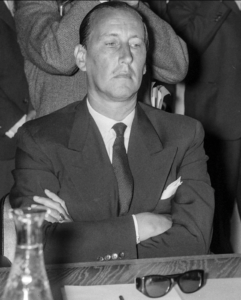
From 2009 until 2014, Gil-Robles presided over Europe’s Jean Monnet Foundation, described on-line as “an independent, non-partisan and non-militant institution of public utility, which operates from the Ferme de Dorigny, located at the heart of the University of Lausanne campus.” It was created in 1978 by Jean Monnet, creator and first president of the first European Community (the coal and steel Community) and he was the first honorary citizen of Europe. He entrusted it with his entire archive, a great historical document that will long be pored over by students of European history. Today, it holds many other private archives which it promotes. One of the most enjoyable tasks I have undertaken in a long career of working within the European Union was to work with Dirk Spierenburg when he was putting together his thoughts (and his notes) for the best written record available on what things were like and how they developed, under the title “The History of the High Authority of the European Coal and Steel Community – Supranationality in Operation. Yes, I know: it’s not the snappiest of titles. It had been co-written by Dirk Spierenburg and his long-term Collaborator, Raymond Poidevin. Spierenburg even signed my copy.
Gil-Robles was no sympathiser with Franco or his followers; he had no time for Fascism. He was a dedicated Roman Catholic and seems to have seen nothing holy about Franco or his followers. He was also much liked and admired across a broad political spectrum. His bonhomie was proverbial, which is why so many of the obituaries written since his death on 13 February have been sympathetic towards him. The writers seem to have liked and admired him. He was a big man in every way: tall, erect, imposing and friendly, while also being a serious man. It was, of course, his large and imposing beard that initially impressed those meeting him for the first time. That, and his smile. Perhaps it was the perfect distraction that led to him being thought of as both left wing and right wing: right-wingers thought he was left wing while left-wingers thought of him as being on the side of the right; the regime, in other words. He wasn’t.
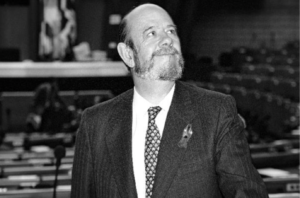
Gil Robles was a lawyer; it was a family tradition and it was a job that suited him ideally, although it didn’t make him rich. Sharing his names with his father must have been inconvenient, since the ruling party of Franco regarded Gil-Robles senior as an enemy. His father was a lawyer, too, but having fled the reach of Fascism in 1939 he ended up practicing his professional legal skills in Portugal. The Gil-Robles I knew was a gentle man, as well as being a gentleman, and he was barely 23 years old when he was accepted into the body representing the Lawyers of the Spanish Cortes, long before it came to represent largely the views of Franco. Gil Robles later joined the Popular Democratic Party of Óscar Alzaga, moving on to the formation of the Popular Alliance which was later converted into the Popular Party and which would become a bedrock of the European People’s Party, under whose banner Gil Robles would challenge for and win the leadership of the group and, of course, the Presidency of the European Parliament itself. His first wife, Magdalena Casanueva Camins, granddaughter of the famous Spanish notary and politician, Cándido Casanueva y Gorjón and with whom he fathered four children, died and after her death, he married Rosario Gil-Delgado Queralt.
| A MAN OF MANY COUNTRIES
At the opening of a plenary session in Strasbourg, President Metsola spoke to the House about Gil-Robles’ legacy: “He will be remembered for having ensured that the Parliament was directly involved in the negotiations of the Amsterdam Treaty including the inclusion of the legal basis for the adoption of the Members’ Statute, thanks to which the Parliament became more independent,” Metsola said. A law professor, after his years in the European Parliament, Gil-Robles occupied the honorary chairmanship of the European Movement International. Between 2008 and 2015, he chaired the Jean Monnet Foundation. He was never a man to let the grass grow under his feet.
Gil-Robles’ father was the historical leader of the Spanish Confederation of Autonomous Rights (CEDA). The family was deeply dedicated to Europe and making it better and stronger, albeit not in a militaristic way. Gil-Robles’ depth of knowledge and hard work were recognised with several awards: the Schuman Medal, awarded by the Group of the European People’s Party, of which he was a dedicated member in 1995), the Cross of Agricultural Merit, the Great Cross of Isabel la Católica and the Great Cross of Civil Merit (Spain).
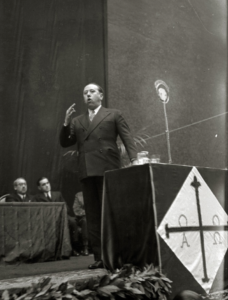
Europe has experienced many problems down the years. “It is always worth remembering,” Gil-Robles said in an interview about his life a decade or so ago, “that Europe is in a perpetual state of crisis and not to become alarmed by the fact that one crisis is succeeded by another.” This forms part of a long interview Gil-Robles gave in 2020 to the Centre Virtuel de la Connaissance sur l’Europe (CVCE), which is an interdisciplinary research and documentation centre dedicated to European integration studies. He told the interviewer that some of his views about the need for a more unified Europe come from the fact that in order to escape Franco and his followers, his father had fled Spain for Portugal, where he himself lived until he was 18 years old. Gil-Robles wrote that Estoril, where he lived, had a very international atmosphere and he found himself mixing with boys of his own age but from many different countries: England, Germany, Italy and elsewhere. “I saw a lot of refugees arriving from Eastern Europe,” he said, “so for me, European issues were prominent from an early age.” He also grew up speaking Portuguese as fluently as he spoke Spanish, so he didn’t view Portugal as a foreign country.
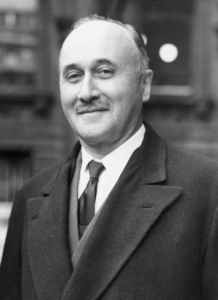
Gil-Robles took great interest in South American politics and he was deeply involved with organisations dedicated to taking a more Europe-wide approach to politics. He was involved in making Spain more democratic, that being the only way it could be allowed to become part of the European Union. He gave statements, wrote books and eventually became a candidate for election to the European Parliament. “I was thrilled,” he said, “because I’ve always been a fervent European, so to become a member of the European Parliament was obviously a dream of mine.” He said he’d had no particular plans for his future; as with most newly-elected MEPs, he spent his time learning the ropes and making contacts. He was an admirer of Jean Monnet, Robert Schuman, Konrad Adenauer and others who helped steer the European Union into successful existence. Gil-Robles wanted to see the European Parliament function more like a national parliament, with greater legislative capacity and control over the EU budget, although he believes he failed with that particular ambition. The budget remains an intractable problem to this day.
| THIS FAR AND NO FURTHER?
Gil-Robles was proud of the progress the EU has made, further and further from the hostility and intolerence of his childhood and towards an integrated political system that works for everybody. He didn’t believe, however, that it should simply go on getting bigger. In his interview for CVCE he said that he believes the EU has effectively reached its limit in terms of membership numbers. He foresaw a risk of xenophobia being prompted and encouraged by the sight of too many people of foreign extraction and also with alien beliefs. He described attempts to exercise some control as a matter of trial and error. “We must wait and see whether we have any success, but it will be difficult.”
However, he continued to believe that there is room for improvement in terms of being good neighbours with each other. He was in favour of more immigration, too, although ensuring the successful integration of future immigrants will always be a challenge, if no longer for him personally. It will also take a very long time, he predicted with some concern. He was especially keen on more peaceful and amicable relations being established with the non-European countries of the Mediterranean, in view of Europe’s historic animosity towards several of them (and theirs towards Europe, in some cases). Having a different religion doesn’t mean they’re not human, after all. Gil-Robles’ dream was of a community in which all countries could participate together in friendship. We must all cooperate with our neighbours. Unfortunately, we must now do it without the wise guiding hand of José María Gil-Robles Gil-Delgado. He has left an indelible mark upon the body he admired and supported and which owes him a debt of gratitude. He will be remembered with gratitude and admiration; the EU needs more people like him, but they’re very hard to find.

